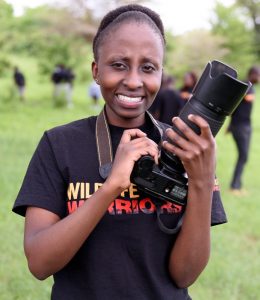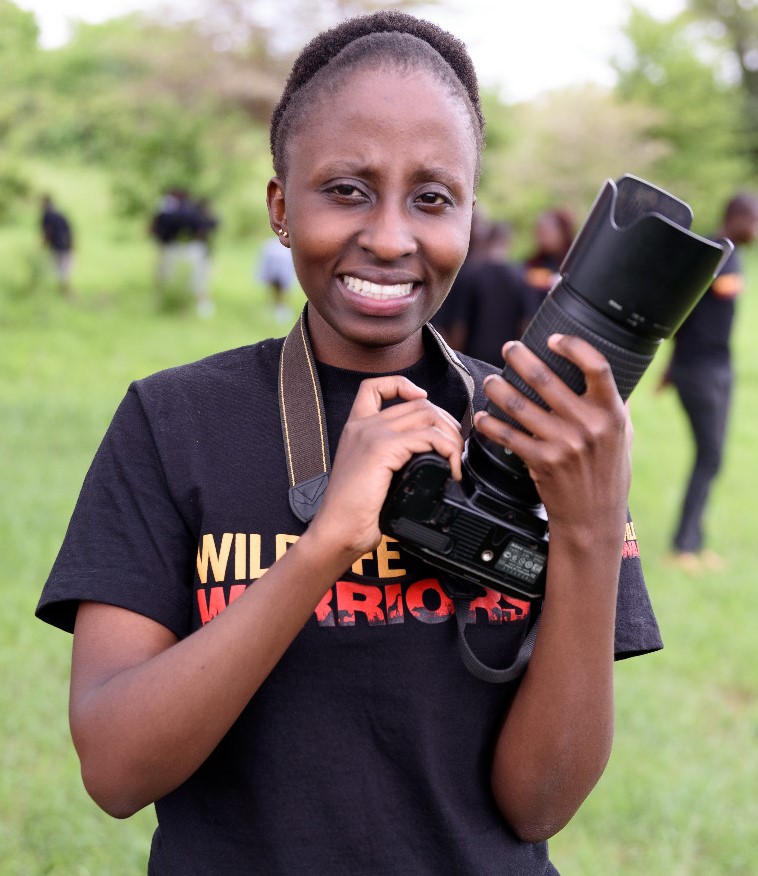
Victoria Wangui is the conservationist who writes. On the 4th of February 2021, Vicky sat with Nyasili Atwetwe for a conversation.
NYASILI: Welcome Victoria
VIKI WANGUI: Thank you, Nyasili. It is a pleasure to be here this evening.
NYASILI: I am also honored to host you this evening. How was your day and how are you doing?
WANGUI: My day was very normal and I am doing awesome.
NYASILI: What happens in your normal day?
WANGUI: A normal day is mostly work where nothing really extraordinary has happened.
NYASILI: Okay. To most here work means teaching students English. Whats work to you?
WANGUI:( laughing) Work for me is advocacy and communication in a wildlife organization. So unless I get to see interesting news, drama, controversy about conservation then it is just a normal day.
NYASILI: Okay. I saw you somewhere with a big camera.
WANGUI: That is not mine…yet…but I claim to be an amateur wildlife/nature/conservation photographer.
NYASILI: Apart from conservation. You also write?
WANGUI: My writing is still part of conservation. I am barely apart from it. But yes, I also write.
NYASILI: How does one inform the other writing/conservation
WANGUI: I have loved nature since when I was young and fortunately got to study about wildlife. The point at which I started writing was realising I had soo many stories to share, stories I could tell friends and family so I thought why not write. Through writing, I was able to discover my voice. Conservativion highly influences my writing in a big way.
NYASILI: (blushing). I imagine all conservatists work in some park.
WANGUI: (laughingly heartily). Not at all. Many wildlife NGO’s are actually in Nairobi. Conservation involves a lot of advocacy other than protecting the animals themselves. People need to know about this animals and being in the park for everyone will not make sense in the long run. Also, I am involved in communication which rarely needs me to be in the park/conservancy. And a conservationist can be you and me even in our towns. I like to say conservation is a lifestyle. You are in it whether you are on the 10th floor of a building or in the middle of a forest.
NYASILI: Thank you for this perspective. I had a narrow understanding of it. So what kind of writing do you do.
WANGUI: Many do have this notion. Even my own family thinks I should be working somewhere in the middle of Samburu.
NYASILI: (laughs out loud).
WANGUI: It depends but mostly essay writing.
NYASILI: What are some of the subjects that your essays cover?
WANGUI: Climate change, sustainability, living a zero waste life, green energy, animal behaviour, travel and camping, wildlife and in general anything and everything to do with conservation -both the dark side and positive side. Oh and I also write about cars which I started recently.
NYASILI: Wow. This is interesting. There is a whole new quest for short stories that handle these broad range of themes. Have you ever tried your hand at it?
WANGUI: Well this is quite tricky considering that motor vehichles play a huge role in aiding climate change but since I love cars, I decided to merge my love for the planet and cars by talking about electric vehicles and the efforts by motor vehicle companies to help in mitigating climate change. Yes I have but most have been linked to where I work or any project I have been involved in.
NYASILI: I have always wondered how a short story about conservation could look like. Perhaps, I could begin by reading yours . Or is it like the stories we used to read in primary school. (za sungura na kaka mbweha)
WANGUI: (laughs) I will make it simple. Have you ever watched a wildlife documentary?
NYASILI: Sure
WANGUI: Did the documentary teach you anything? If it did then think of it in a short story form. I could, for example, write about climate change in another area and highlight the issue then and now, comparing how people lived differently such as ease of access to water.
NYASILI: Okay. Could it also be futuristic?
WANGUI: Or maybe discussing wildife behaviour and how it connects to each and everyone one of us.
NYASILI: Where you act as a prophet of doom to a generation that is refusing to conserve.
WANGUI: My goal is always to answer the questions people ask.
NYASILI: Okay
WANGUI: (laughs) I try to be positive as much as possible and even though I am writing about doom like let’s say Greta Thunberg (Google her ) I always end with solutions, actionable solutions which I have seen work elsewhere. I would actually say my writing is also very much research based since I do not want to claim it will flood next year yet there is no proof behind it.
NYASILI: What interested you about cars?
WANGUI: For me it is the whole machinery accept. I tend to see there is a lot going on for a car to be a car and all parts have to be in sync for it to function. This is the same way I think about nature. If something goes wrong, even something small, a car will not function as it is meant to be. Same thing with nature; when something is a miss we see the effects even if it is after 30 years.
NYASILI: Okay. (jokingly) For a moment I thought you have started a blog on how to about cars.
WANGUI: (laughs) This needs expert opinion and serious petrol heads. With electric cars now a big thing it’s something to think about thpugh
NYASILI: It could help though. There are some ignoramus here at the space like Kamiru Vinky, Mukonya Mukonya, who cannot tell a cars front from its back.
WANGUI: (a heart laugh)They cannot be helped at this point in life unless it’s a step by step guide.
NYASILI: I hear rhinos will be extinct soon. It is sad because the only rhino I have seen is our form three geography teacher whom we nicknamed rhino because he was hefty and dark and cantakerous.
WANGUI: (laughs) I hope he is still alive. The status of the rhino globally is scary but not for all species. The northern white rhino has remaining adults birth female both cannot breed (with who anyway( or carry a baby rhino but there are prospects to use science to create embryos. This was actually successful but it is not something I believe in. The western black rhino is extinct globally. The Southern White Rhinos are actually in plenty; close to 20k mostly in south Africa with some in Kenya while the Eastern black rhino, mostly found in East Africa is struggling to increase in number. The reason for this is the demand for rhino horn as traditional Chinese medicine in most of Asia, especially Vietnam, yet rhino horn is made of the same material as our hair and fingernails – Keratin. Rhinos found in Asia (Javan, Sumatran) are also very few in number and could go extinct. You could ask “why are rhinos important anyway?”
NYASILI: Sure why?
WANGUI: Well, remember what I said about cars, in the environment or ecosystem as it is called, rhinos are ecosystem engineers. This means rhinos, through their feeding habits make it easier for other wildlife to thrive. When they feed, with their huge mass they clear land for antelopes to move and feed, this promotes breeding since food and water are essential in the animal kingdom. With a thriving antelope population the carnivore population also thrives. All this belong to that one ecosystem which provides ecosystem services. The ecosystem services include acting as a carbon storage which mitigates global warming.
NYASILI: Okay. I am learning here.
WANGUI: I would give an example of Nairobi National Park which has a large black rhino population. Why do you think conservationist are up in arms protecting it?Nyasili: You tell us
NYASILI: You tell us.
WANGUI: It is really not about the status of the park as being the only park in the city in the world. If at all Nairobi national park was taken over and sky scrapers built, Nairobi would slowly become inhabitable.
NYASILI: How?
WANGUI: There is an entire cycle of life in that park that is keeping her alive. From the rhino (feeding habits also help in seed dispersals) to the antelopes and zebras fed on by lions to the vultures which feed on the carcasses. All this belong to one space which ensures the ecosystem thrives.
NYASILI: Okay
WANGUI: Also, the park is a major carbon sink (mitigating climate change) and reduces flooding in the city and its environs. Without the animals including insects and snakes the land would be bare. There would be no new plants since no animal is defeacating and no insects are pollinating. It would become a bare desert. I hope I have made it simple to understand.
NYASILI: This is actually quite interesting to know because it is easy to ignore how interconnected things are. I am amazed by how passionate you are about conservation. Do you think writers have a role to play in conserving the environment?
WANGUI: Thank you. Environmental conservation should not be left to conservationist and environmentalist alone! We are all a part of nature.
NYASILI: Am curious! What is the role of weed in environmental conservation? Am asking for a friend in this group actually?
WANGUI:(laughing) It depends. Local weeds have no harm but invasive weeds (weeds whose origin is from another country mostly continent) can be a disaster. Weeds in a wild environment can actually be food for an animal or shelter for insects, lizards, snakes, frogs, toads. An easy example, sea weed is food for turtles.
NYASILI: Now you did not get the question. I am talking about the original weed -the one that some wants legalized here. Not these other weed that are not weed
WANGUI: (laughs) When you are speaking to an conservationist you have to specify.
NYASILI: I have now I hope.
WANGUI: Actually, did you know weed can actually be a good source of paper? We do not need to cut down our trees when we could just farm weed for paper.
NYASILI: You should help me write this proposal actually. (laughs)
WANGUI: (laughs) I could try.
NYASILI: Vicki where does someone read your work? It seems, if there, to be quite informative and educative already.
WANGUI: I can be found here (https://www.nyikasilika.org/.) Thank you so much
NYASILI: Thanks. I will follow through
WANGUI: You can start with why I do not think the northern white rhino can be saved here (https://www.nyikasilika.org/does-the-northern-white-rhino-need-to-be-saved/)
NYASILI: Do you live in Nairobi.
WANGUI: I live within its environs. It is accessible to me.
NYASILI: Oh! For how long have been here(writers space Kenya).
WANGUI: I think its not been a year. I am not sure Benny Wanjohi would know.
NYASILI: How has the group helped you as a conservatist who writes?
WANGUI: Generally as a writer, it is great to be in platform with other writers. You get to learn from other people.
NYASILI: Any take homes for you?
WANGUI: Conservation is a lifestyle and we should all be kind to the planet we call home.
NYASILI: Any ideas on what we could do to make this space more vibrant
WANGUI: I like what you are doing with the interviews and the meet ups. So for now I am good with it.
NYASILI: Thanks. I would like to thank you for giving us your evening today.
WANGUI: Thank you. This has been fun.
NYASILI: It was my pleasure to host you.
Compiled by Paul Wambua, contributing editor.

